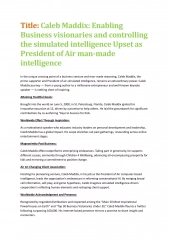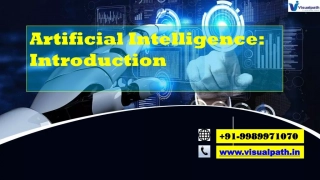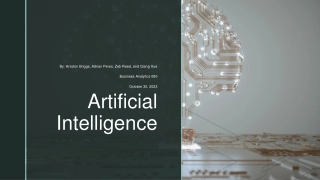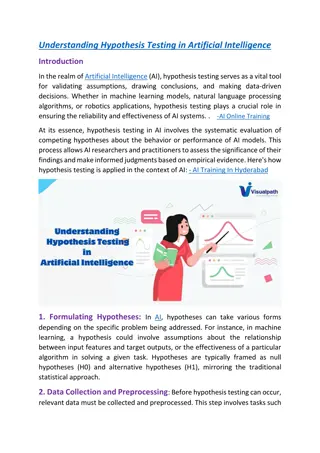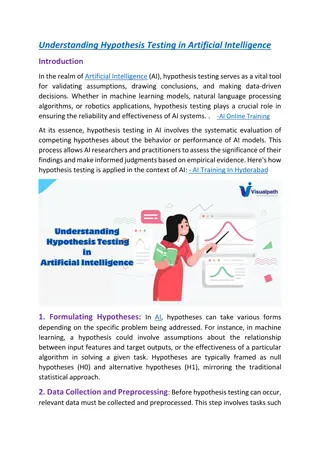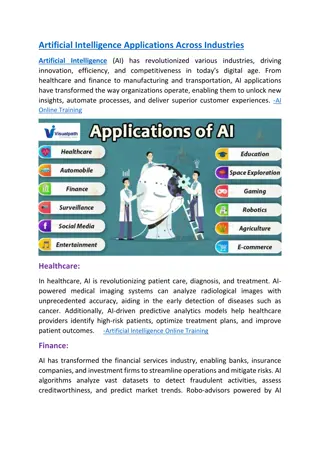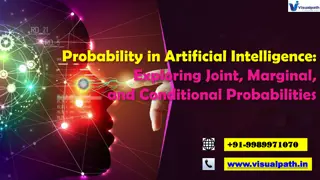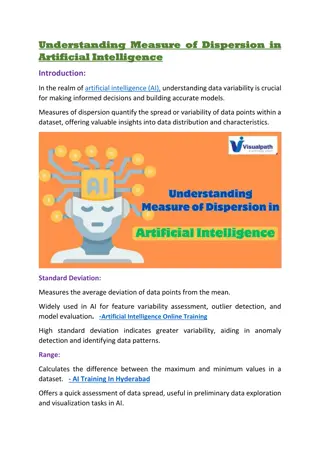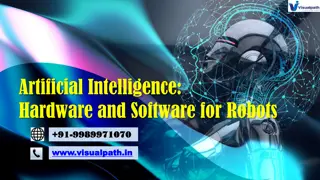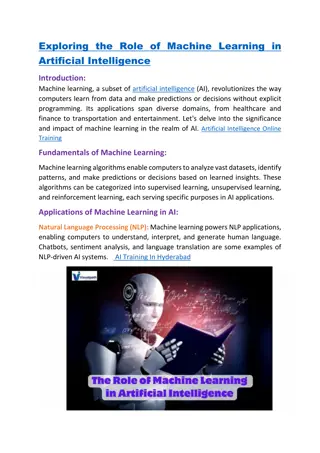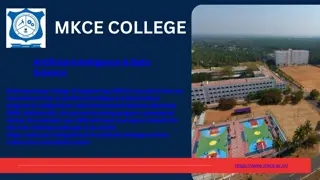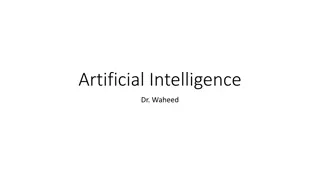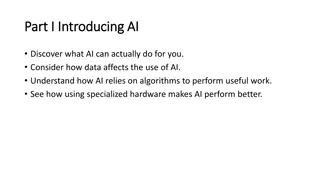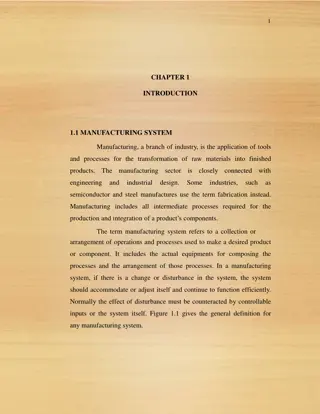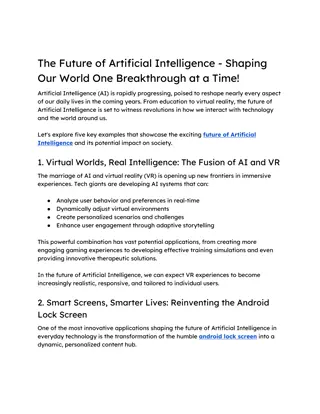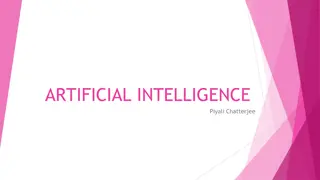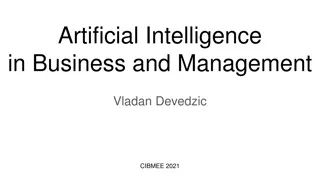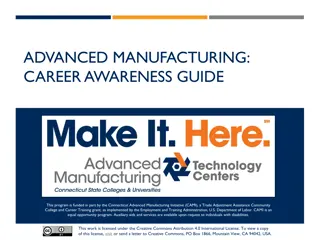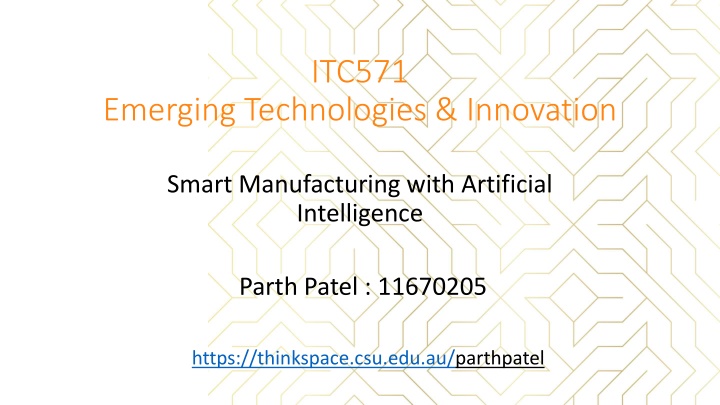
Smart Manufacturing with Artificial Intelligence: Revolutionizing Industry
Manufacturing industry is experiencing a revolution with the integration of Artificial Intelligence. Discover how AI is making manufacturing faster, better, and cheaper while addressing the need for flexible, reconfigurable factories and creating cyber jobs through automation, machine learning, and predictive engineering.
Download Presentation

Please find below an Image/Link to download the presentation.
The content on the website is provided AS IS for your information and personal use only. It may not be sold, licensed, or shared on other websites without obtaining consent from the author. If you encounter any issues during the download, it is possible that the publisher has removed the file from their server.
You are allowed to download the files provided on this website for personal or commercial use, subject to the condition that they are used lawfully. All files are the property of their respective owners.
The content on the website is provided AS IS for your information and personal use only. It may not be sold, licensed, or shared on other websites without obtaining consent from the author.
E N D
Presentation Transcript
ITC571 Emerging Technologies & Innovation Smart Manufacturing with Artificial Intelligence Parth Patel : 11670205 https://thinkspace.csu.edu.au/parthpatel
Introduction Manufacturing needs to be Smart !! Artificial Intelligence has come a long way. Combining Artificial Intelligence with the manufacturing Industry can bring the much needed Industrial Revolution. Artificial Intelligence can make manufacturing: - Faster - Better - Cheaper
Future of Manufacturing Systems Engineering Product lifetime is short and diversity is large so a flexible and reconfigurable factory is needed. Factories can be designed by using analytical methods Manufacturing needs movement, less lead time, generic software, reduced human involvement and reduced inventory this can only be possible by successfully implementing artificial Intelligence. Variability faster data Uncertainty Randomness Gershwin, S. B. (2018). The future of manufacturing systems engineering. International Journal of Production Research, 56(1-2), 224-237. Retrieved from https://primo.csu.edu.au/permalink/61CSU_INST/15aovd3/informaworld_s10_1080_002075 43_2017_1395491
Smart Manufacturing Automation is the next wave to create cyber jobs rather than traditional jobs. Machine Learning can be used to have an integrated production. Smart manufacturing is about autonomy, evolution, simulation and optimization. Resource sharing & networking Processes Sustainability Materials Predictive Engineering Data Kusiak, A. (2018). Smart manufacturing. International Journal of Production Research, 56(1-2), 508-517. Retrieved from https://primo.csu.edu.au/permalink/61CSU_INST/15aovd3/informaworld_s10_1080_002075 43_2017_1351644
Ten Conjectures of Smart Manufacturing Manufacturing digitalisation Greater horizontal connectivity and interoperability Increased reliance on modelling, optimisation and simulation Resource sharing Material-product-process phenomenon Equipment monitoring, diagnosis and repair autonomy Standardisation and collaboration Vertical separability of the physical assets and the cyberspace Enterprise dichotomy Cybersecurity and safety Kusiak, A. (2018). Smart manufacturing. International Journal of Production Research, 56(1-2), 508-517. Retrieved from https://primo.csu.edu.au/permalink/61CSU_INST/15aovd3/informaworld_s10_1080_002075 43_2017_1351644
Applications of Artificial Intelligence in Intelligent Manufacturing Internet plus artificial Intelligence is the way forward in the new industrial revolution. It is characterized by ubiquitous networks, data- drivenness, shared services, cross- border integration, automatic intelligence and mass innovation. Artificial Intelligence includes intensive deep learning, Internet-based swarm intelligence, technology-oriented human machine hybrid augmented intelligence and cross-media reasoning. Manufacturing Industry needs Artificial Intelligence to reduce lead time, improve quality and decrease complexity. Li, B. H., Hou, B. C., Yu, W. T., Lu, X. B., & Yang, C. W. (2017). Applications of artificial intelligence in intelligent manufacturing: a review. Frontiers of Information Technology & Electronic Engineering, 18(1), 86-96. Retrieved from https://primo.csu.edu.au/permalink/61CSU_INST/15aovd3/springer_jour10.1631%252FFITEE.1601885
RESULTS/FINDINGS: Failures of Traditional Method Failure to deliver on time Lack of Skilled Labour High Production Cost Inconsistent Quality Risk to human lives (In Refinery, Petrochemical Industries) Competitive Market Maintenance Cost
RESULTS/FINDINGS: Why Artificial Intelligence ? Artificial Intelligences Qualities Result Direct Automation - Reducing Human Effort - On Time Delivery 24/7 Production - - Increased Production Capacity Reducing the need of multiple factories Safety - - Protection for Employees Less Insurance Costs Lower Operational Costs - - Competitive production cost Higher Profits Greater Efficiency - - Production at full strength Reduced machine breakdown Quality Control- - - Consist quality Less Rejection Quick Decision Making - Eliminating Human Error
Reflection: Manufacturing Industry needs to new technology Artificial Intelligences 2.0 is much more reliable then the earlier version. Artificial Intelligence might be the solution which can bring the new industrial revolution. AI can bring the below changes : Reduce Human Effort Increase Quality & Capacity Decrease Cost Improve Traceability
References: Gershwin, S. B. (2018). The future of manufacturing systems engineering. International Journal of Production Research, 56(1-2), 224-237. Retrieved from https://primo.csu.edu.au/permalink/61CSU_INST/15aovd3/informaworld_s10_1080_002075 43_2017_1395491 Kusiak, A. (2018). Smart manufacturing. International Journal of Production Research, 56(1-2), 508-517. Retrieved from https://primo.csu.edu.au/permalink/61CSU_INST/15aovd3/informaworld_s10_1080_002075 43_2017_1351644 Li, B. H., Hou, B. C., Yu, W. T., Lu, X. B., & Yang, C. W. (2017). Applications of artificial intelligence in intelligent manufacturing: a review. Frontiers of Information Technology & Electronic Engineering, 18(1), 86-96. Retrieved from https://primo.csu.edu.au/permalink/61CSU_INST/15aovd3/springer_jour10.1631%252FFITEE.160 1885

